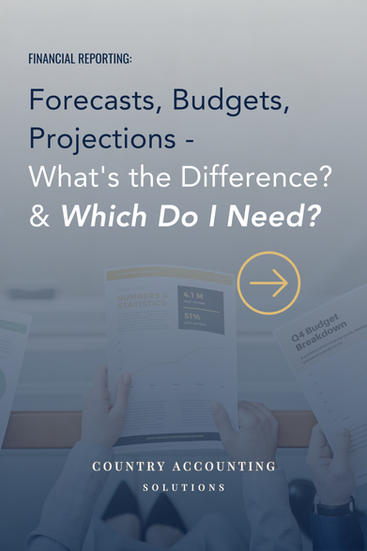Forecasts, Budgets, Projections - What's the Difference and Which Do I Need?
- Candice Regan
- Jul 8, 2024
- 4 min read
Updated: Jul 10, 2024
In the realm of accounting and business management, the terms forecasts, budgets, and projections are often used interchangeably. However, each term has a distinct meaning and serves a specific purpose in the financial planning and management process. Understanding the differences between these terms is crucial for effective financial planning and decision-making. This essay seeks to demystify these concepts and provide a comprehensive analysis of their definitions, differences, and applications in business.
Forecasts
Definition and Purpose:
A financial forecast is a forward-looking statement that estimates a company’s future financial performance based on historical data, current trends, and anticipated market conditions. Forecasts typically cover a shorter period, such as a quarter or a year, and are updated periodically to reflect new information and changes in the business environment.
Key Characteristics:
Flexibility: Forecasts are dynamic and can be adjusted as new information becomes available. This makes them an essential tool for ongoing decision-making and strategy adjustment.
Short-term Focus: While forecasts can project longer periods, they are particularly useful for short-term planning. They provide a near-term outlook on revenues, expenses, cash flows, and other financial metrics.
Data-Driven: Forecasts rely heavily on historical financial data, current business trends, and market conditions to predict future performance.
Applications:
Revenue Predictions: Forecasts help businesses estimate future sales and revenue based on current market trends.
Expense Management: By predicting future costs, businesses can better manage their expenses and avoid budget overruns.
Cash Flow Planning: Forecasts aid in predicting cash flow needs, helping businesses ensure they have sufficient liquidity to meet their obligations.
Budgets
Definition and Purpose:
A budget is a detailed financial plan that outlines an organization’s expected revenues, expenses, and financial position over a specific period, typically one year. Budgets are usually set before the start of the fiscal year and serve as a benchmark for managing future financial performance.
Key Characteristics:
Static: Once established, a budget remains relatively fixed, providing a baseline against which actual performance is measured.
Comprehensive: Budgets cover all aspects of the business, including revenues, operating expenses, capital expenditures, and cash flows. They are often divided into smaller segments for different departments or projects.
Goal-Oriented: Budgets are aligned with the strategic objectives of the company and help allocate resources to achieve these goals.
Applications:
Performance Measurement: Budgets provide a reference point for measuring actual performance against planned targets, identifying variances, and implementing corrective actions.
Resource Allocation: Budgets guide the allocation of resources, ensuring that funds are distributed in a manner that supports strategic priorities.
Cost Control: By setting spending limits, budgets help businesses control costs and prevent overspending.
Projections
Definition and Purpose:
Financial projections are estimates of future financial outcomes based on hypothetical scenarios and assumptions. Projections are often used for long-term planning and strategic decision-making, exploring how different variables and decisions might impact future performance.
Key Characteristics:
Hypothetical: Projections are based on assumptions about future events, which may or may not occur. They explore various "what-if" scenarios.
Long-term Focus: Projections typically cover longer periods, often spanning several years, and are used for strategic planning.
Scenario-Based: Projections consider various scenarios, such as market expansion, economic downturns, or significant investment opportunities, and estimate their financial impact.
Applications:
Strategic Planning: Projections help businesses evaluate the potential outcomes of different strategic decisions and plan for future growth.
Investment Analysis: Projections are used to assess the financial viability of potential investments or business ventures.
Risk Management: By considering different scenarios, projections help businesses identify and mitigate potential risks.
Which Do I Need?
When determining which financial tool to use, consider the specific needs and goals of your business.
If your focus is on short-term planning and adapting to current conditions: Forecasts are your best tool. They provide a flexible and timely view of your financial outlook, helping you make informed decisions based on the latest data.
For setting financial targets and controlling costs: A budget is essential. It establishes a financial roadmap for the year, guiding resource allocation and performance measurement.
When engaging in long-term strategic planning or evaluating major decisions: Use projections. They allow you to explore different scenarios and assess potential future outcomes.
In practice, businesses often use all three tools in combination. Forecasts update budgets with real-time data, providing a dynamic view of performance. Budgets establish the financial framework for the year, while projections help chart the course for long-term growth and strategic direction.
Conclusion
Forecasts, budgets, and projections each play a distinct and vital role in financial planning and management. By understanding their differences and applications, businesses can leverage these tools to navigate the complexities of financial decision-making, optimize performance, and achieve strategic objectives. Whether managing day-to-day operations, setting annual financial targets, or planning for the future, a well-rounded approach that integrates forecasts, budgets, and projections is essential for sustained success. Based on what we predict will happen looking ahead, this is where we want to go. At Country Accounting Solutions, we offer personalized support to help you integrate and leverage these reports, ensuring you have the right tools to navigate today's dynamic business environment confidently.












Comments